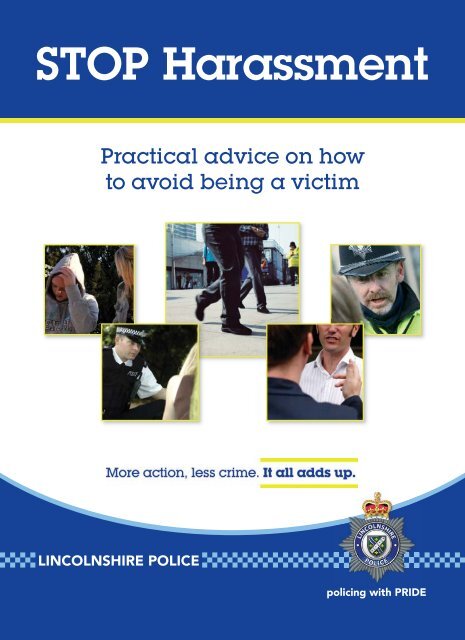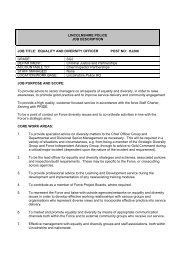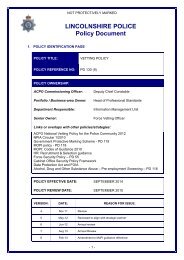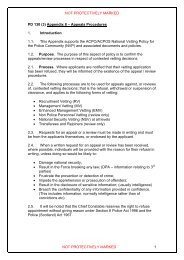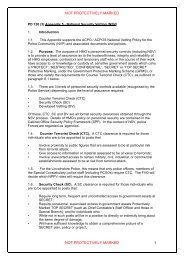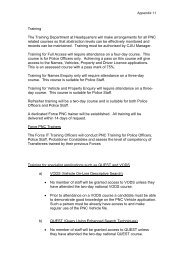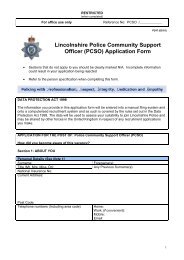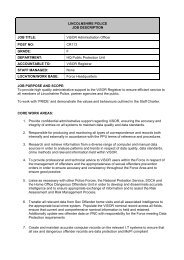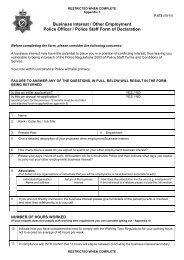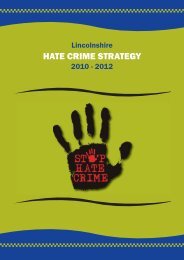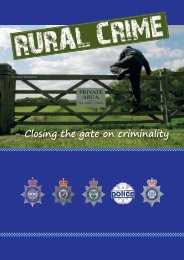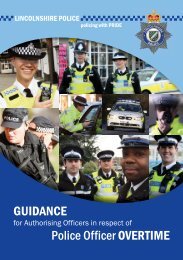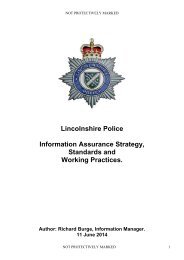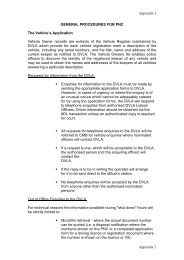Stalking and Harassment Booklet.pdf - Lincolnshire Police
Stalking and Harassment Booklet.pdf - Lincolnshire Police
Stalking and Harassment Booklet.pdf - Lincolnshire Police
Create successful ePaper yourself
Turn your PDF publications into a flip-book with our unique Google optimized e-Paper software.
STOP <strong>Harassment</strong><br />
Practical advice on how<br />
to avoid being a victim<br />
LINCOLNSHIRE POLICE<br />
policing with PRIDE
STOP HARASSMENT<br />
Introduction<br />
The <strong>Harassment</strong> Act of 1997 was<br />
passed to help prevent cases of<br />
“stalking” <strong>and</strong> other similar<br />
unsocial conduct. There is no<br />
specific offence of “stalking” as<br />
such <strong>and</strong> the term is descriptive<br />
rather than a legal term. The Act<br />
refers to harassment, which can<br />
take many forms, “stalking” is one<br />
of the more extreme elements of<br />
harassment.<br />
<strong>Harassment</strong> can be described as a<br />
series of acts, which are intended<br />
to, or do cause harassment to<br />
another person <strong>and</strong> can include<br />
behaviour that puts a victim in fear<br />
of violence. The methods used to<br />
cause harassment to another are<br />
varied <strong>and</strong> sometimes involve<br />
actions, which do not overtly<br />
threaten an individual <strong>and</strong> can<br />
appear routine or harmless <strong>and</strong><br />
therefore not covered by existing<br />
legislation. Following someone<br />
down the street or sending them<br />
flowers are examples of these types<br />
of behaviour, that can be<br />
intimidating if persistently inflicted<br />
on someone against their will.<br />
Other actions used against a victim<br />
such as threatening, abusive or<br />
obscene phone calls, messages,<br />
letters, or language <strong>and</strong> acts of<br />
violence can <strong>and</strong> should be dealt<br />
with by existing criminal legislation.<br />
The following is brief guide on how<br />
to deal with behaviour you consider<br />
to be causing you harassment <strong>and</strong><br />
gives tips <strong>and</strong> advice on how to<br />
avoid these types of behaviour.<br />
1
STOP HARASSMENT<br />
Advice to Victims<br />
Help the police<br />
help you<br />
By gathering evidence:<br />
• If you fear you are in<br />
immediate danger, call 999<br />
• If you think you are being<br />
subjected to harassment,<br />
report your concerns to<br />
police, no matter how trivial<br />
the harassment may seem<br />
to you. You can call<br />
<strong>Lincolnshire</strong> <strong>Police</strong> on<br />
101 or tell us online by<br />
visiting the <strong>Lincolnshire</strong><br />
<strong>Police</strong> website<br />
www.lincs.police.uk<br />
• Keep a record of what happened,<br />
where, when, every time you were<br />
followed, phoned, got post or e-mail<br />
messages etc<br />
• If possible, download onto disk <strong>and</strong><br />
print out a hard copy of e-mails but<br />
keep originals for the police<br />
• If you have a mobile phone, do not<br />
tamper with or dispose of the SIMcard<br />
as it may contain valuable<br />
evidence<br />
• The more details you have regarding<br />
the offender the better: how they<br />
look or sound, what they wear, the<br />
make, model, registration, colour of<br />
the car etc<br />
• Make notes in a diary as these may<br />
be used later at any court<br />
proceedings. Write down information<br />
as soon as possible while it is still<br />
fresh in your mind. Include dates,<br />
times <strong>and</strong> any details of people who<br />
may have witnessed what happened<br />
• Find out if any of your neighbours<br />
saw what happened, or details of any<br />
other witnesses<br />
2
practical advice on how to avoid being a victim<br />
• Keep letters <strong>and</strong> parcels as evidence,<br />
even if they contain frightening,<br />
distressing or upsetting messages.<br />
Do not throw them away, keep them<br />
stored safely <strong>and</strong> in a manner that<br />
means you don’t have to h<strong>and</strong>le<br />
them<br />
• If you recognise the h<strong>and</strong>writing, you<br />
can keep the letter or parcel as<br />
evidence without having to open it<br />
<strong>and</strong> read the contents<br />
• Record <strong>and</strong> retain any telephone<br />
conversations if possible<br />
• Make sure you keep any stored<br />
messages, including texts <strong>and</strong> any<br />
telephone numbers that you have<br />
received on your mobile phone <strong>and</strong><br />
caller ID units<br />
• Use 1471 on your phone <strong>and</strong> write<br />
down <strong>and</strong> keep any numbers, even if<br />
you did not answer the call<br />
• Try to get a photograph or video<br />
evidence of the person harassing you,<br />
especially if they are someone who<br />
has previously been warned by the<br />
police regarding actions against you<br />
• Advise your family, friends,<br />
neighbours <strong>and</strong> work colleagues<br />
about what is happening <strong>and</strong> keep<br />
notes of anything they see <strong>and</strong> hear.<br />
They can act as independent<br />
witnesses <strong>and</strong> tell you of anything<br />
they may see when you’re not there<br />
• Retain envelopes as well as contents<br />
• Do not staple, mark or pin any<br />
documents<br />
• Place any foodstuffs in a plastic<br />
container <strong>and</strong> freeze<br />
• If you believe something may provide<br />
evidence do not move, clean, tidy or<br />
disturb it <strong>and</strong> prevent any other<br />
persons or pets from doing so<br />
• If possible do not enter or disturb any<br />
areas where you believe a suspect<br />
may have been<br />
• If you see any unidentified liquids or<br />
substances do not disturb them, but<br />
cover the area with a box <strong>and</strong> show<br />
to police<br />
• Inform police if you think it is a hate<br />
crime <strong>and</strong>/or related to your<br />
disablility, gender, race, sexual<br />
orientation or religion<br />
3
STOP HARASSMENT<br />
How you can help yourself<br />
• Take a mobile phone when out <strong>and</strong><br />
about<br />
• Carry a personal attack alarm <strong>and</strong><br />
learn how to use it - but do not carry<br />
anything that is meant for use as a<br />
weapon<br />
• Think about improving your home’s<br />
security, ask the police or district<br />
council for advice<br />
• Try to alter your daily routines, ask<br />
friends to go with you whenever<br />
possible <strong>and</strong> always try to let<br />
someone know what your plans are<br />
<strong>and</strong> if you have to change them<br />
• If you are being harassed at a college<br />
or university, think about telling a<br />
tutor or department head who might<br />
be able to put a stop to it. In-house<br />
support groups are available<br />
• At banks, building societies <strong>and</strong><br />
other cash outlets you may be asked<br />
for your mothers maiden name as a<br />
security password. This name is<br />
available to anyone researching<br />
public records. It is okay to use<br />
something else<br />
• When out <strong>and</strong> about, if you feel<br />
insecure, look out for places such as<br />
24-hour petrol stations, shops, police<br />
stations or other emergency service<br />
establishments where you could go<br />
for help<br />
4
practical advice on how to avoid being a victim<br />
If you know or find out whom is<br />
harassing you<br />
• Remember not to confront the<br />
person harassing you or even engage<br />
them in conversation<br />
• Do not, under any circumstances,<br />
agree to meet them to talk about<br />
how their constant bothering of you,<br />
makes you feel<br />
• Do not respond in any way to calls,<br />
letters or conversations. If you ignore<br />
the phone nine times then pick it up<br />
on the tenth you may send the<br />
message that persistence pays. Once<br />
they have your attention they may be<br />
encouraged to carry on<br />
5
STOP HARASSMENT<br />
Avoiding unwanted phone calls<br />
If someone makes phone calls that<br />
are offensive, abusive, threatening or<br />
simply worryingly frequent:<br />
• Just say “hello” when you answer<br />
your phone, but do not give your<br />
name or number<br />
• Try to remain calm <strong>and</strong> not show any<br />
emotion, many callers will give up if<br />
they don’t think they’re making any<br />
impression on you or your feelings<br />
• Try not to encourage the caller with<br />
an emotional response, remember its<br />
your phone <strong>and</strong> you are in control<br />
• Use an answer machine to “screen<br />
out” calls <strong>and</strong> only talk to the people<br />
you want to. Caller ID units are<br />
another way of ensuring you know<br />
who is calling before you answer the<br />
phone<br />
• Ask a friend to record the outgoing<br />
message on your answer machine, for<br />
example a mans voice (at the<br />
residence of a woman) might throw<br />
the caller off balance<br />
• Make sure any message doesn’t<br />
make it clear you’re alone or out, use<br />
“We’re not free to come to the<br />
phone right now” as opposed to “I’m<br />
not at home”<br />
• Do not enter into a conversation,<br />
simply put the h<strong>and</strong>set down <strong>and</strong><br />
walk away <strong>and</strong> ignore it for a few<br />
minutes before gently replacing it.<br />
You do not have to listen to what the<br />
caller says<br />
• If the caller continues to phone you,<br />
don’t say anything when you pick up<br />
the h<strong>and</strong>set, a genuine caller will<br />
speak first<br />
• Don’t ever give out any details about<br />
yourself or your family unless you are<br />
absolutely sure you know <strong>and</strong> trust<br />
the caller<br />
• Dial 1471 <strong>and</strong> keep a note of any<br />
number that called, when <strong>and</strong> for<br />
how long<br />
• Contact your telephone provider, the<br />
operator will be able to tell you who<br />
to talk to regarding blocking numbers<br />
etc<br />
• Decide if you wish to change your<br />
number to an ex-directory one<br />
6
practical advice on how to avoid being a victim<br />
Telephone network providers<br />
The company providing you with<br />
your phone network service (e.g. BT,<br />
NTL), should be able to offer<br />
assistance <strong>and</strong> advice if you are<br />
receiving nuisance calls <strong>and</strong> in<br />
extreme cases can also work with the<br />
police to trace calls (making malicious<br />
calls is a criminal offence in it’s own<br />
right <strong>and</strong> callers can be prosecuted).<br />
Phone providers may have nuisance call<br />
advisors who can give simple advice on<br />
the most suitable action to take.<br />
Contact them directly<br />
BT as one of the largest phone<br />
network providers offers a range of<br />
services to help if you are receiving<br />
nuisance calls.<br />
• Telephone <strong>and</strong> Fax Preference<br />
Service, if you do not wish to receive<br />
direct marketing phone calls or fax’s<br />
you can register free of charge to<br />
block them<br />
0845 0700 707<br />
www.tpsonline.org.uk<br />
• BT<br />
‘Choose to Refuse’<br />
bar last call answered<br />
bar numbers at any time<br />
BT Broadb<strong>and</strong> barring calls<br />
Anonymous call rejection<br />
0800 800 150 (l<strong>and</strong>line)<br />
0330 123 4150 (mobiles)<br />
Monday to Friday 8am - 9pm<br />
Saturday 8am - 8pm<br />
Sunday 9am - 6pm<br />
www.bt.co.uk<br />
• Choose to refuse, a service that<br />
allows you to block calls from<br />
specified numbers which may prove<br />
useful when you have received<br />
nuisance or malicious calls<br />
Other network providers may also be<br />
able to offer help <strong>and</strong> advice.<br />
7
STOP HARASSMENT<br />
Avoid being<br />
harassed on the<br />
Internet<br />
If you are<br />
harassed on the<br />
Internet<br />
• Always remember you are never<br />
totally anonymous on the Internet,<br />
use your stranger danger instincts<br />
• Use an on screen nickname that<br />
doesn’t make it easy to guess your<br />
real identity, or even your gender<br />
• Never give out your password, even<br />
to someone who claims to be from<br />
your Internet company<br />
• Do not give out personal information,<br />
such as a photograph of yourself or<br />
details of telephone numbers <strong>and</strong><br />
credit cards, to people you talk to in<br />
chat rooms or newsgroups<br />
• Be careful if you answer junk mail<br />
If you receive offensive, or<br />
threatening emails or messages on<br />
screen:<br />
• Do not delete the messages, save<br />
them onto a disk or print them out<br />
• Keep all paper <strong>and</strong> hard copies,<br />
together with any other evidence <strong>and</strong><br />
call the police<br />
• You can contact your Internet Service<br />
Provider who may be able to block<br />
incoming e-mails from specified<br />
addresses<br />
• Consider changing your e-mail<br />
address<br />
• Log off (leave the “room”), if you are<br />
uncomfortable with what is being<br />
said in chat channels<br />
• It is safer not to meet people you<br />
have chatted to on-line. If you do<br />
decide to meet them, take a friend<br />
<strong>and</strong> meet in a public place where you<br />
feel safe<br />
8
practical advice on how to avoid being a victim<br />
Internet safety for children<br />
• Schools <strong>and</strong> others monitoring<br />
children should be careful when<br />
giving out details of school trips <strong>and</strong><br />
sports activities<br />
• Families might want to keep<br />
computers in a shared space, rather<br />
than a child’s bedroom, this will make<br />
informal control of what they see on<br />
screen easier<br />
• Make sure children know the dangers<br />
the Internet can pose <strong>and</strong> explain<br />
about not supplying personal details<br />
<strong>and</strong> not getting into conversations or<br />
arranging to meet people<br />
• Advise against opening links to other<br />
sites-they could contain<br />
pornographic or other unsuitable<br />
material<br />
• Encourage your children to tell you<br />
about anything they’ve seen that<br />
worries them<br />
USEFUL WEBSITES<br />
• www.thinkuknow.co.uk<br />
• www.ceop.gov.uk<br />
• www.getnetwise.org<br />
9
STOP HARASSMENT<br />
<strong>Harassment</strong> <strong>and</strong> minimising risks<br />
to children<br />
Ask children to always tell you or<br />
someone about their plans, stress the<br />
importance of them doing so.<br />
Injunctions<br />
If there is an injunction in force in<br />
relation to a child, contact the child’s<br />
school <strong>and</strong> notify them about the<br />
injunction <strong>and</strong> who it is against, along<br />
with a picture of that person.<br />
The school will then be aware that this<br />
person should not contact the child at<br />
school, or collect them (unless<br />
permission has been granted to do so),<br />
but also inform the school of those<br />
people who you do allow to pick up the<br />
child.<br />
Travel<br />
Make sure a child knows what to do, or<br />
who to call if the person they are<br />
expecting to collect them does not<br />
arrive. This should also be the case if<br />
their usual method of transport (such as<br />
school bus, taxi etc) does not turn up. If<br />
necessary, children should vary their<br />
routes to <strong>and</strong> from schools <strong>and</strong> out of<br />
school activities.<br />
10
practical advice on how to avoid being a victim<br />
Out <strong>and</strong> about<br />
Children should be encouraged to stay<br />
in small groups, which not only assists<br />
general safety but may also provide<br />
witnesses if they are subject to<br />
harassment. Most youngsters have<br />
mobile phones these days, which is a<br />
useful tool in an emergency or difficulty<br />
encountered by them. Numbers can be<br />
stored on the phone of who to call if an<br />
emergency does occur.<br />
Make children aware of places they can<br />
go to for safety or help if needed such<br />
as 24-hour petrol station, shops or<br />
emergency service establishments.<br />
End of relationship<br />
When a teenage relationship ends, the<br />
rejected party may react badly <strong>and</strong> start<br />
to harass their ex-partner.<br />
If this occurs advise the person being<br />
harassed not to respond in any way<br />
to any calls, letters, e-mails or<br />
conversations as this may encourage<br />
that person. Report that contact to<br />
the police.<br />
USEFUL CONTACTS<br />
• HIDEOUT<br />
www.thehideout.org.uk<br />
• CHILDLINE<br />
0800 11 11<br />
www.childline.org.uk<br />
• NSPCC<br />
0808 800 5000<br />
www.nspcc.org.uk<br />
(for adults concerned about a child)<br />
• THIS IS ABUSE<br />
http://thisisabuse.direct.<br />
gov.uk/<br />
11
STOP HARASSMENT<br />
Support groups<br />
Various organisations can offer help <strong>and</strong> advice on matters of stalking <strong>and</strong><br />
harassment.<br />
The National <strong>Stalking</strong> Helpline<br />
Tel: 0808 802 0300<br />
Web: www.stalkinghelpline.org<br />
Practical advice <strong>and</strong> information to anyone<br />
who is currently or previously has been<br />
affected by harassment or stalking.<br />
Protection Against <strong>Stalking</strong><br />
www.protectionagainststalking.org<br />
Protection Against <strong>Stalking</strong> (formerly the<br />
CRT Trust) works jointly with relevant<br />
agencies to increase awareness of <strong>Stalking</strong><br />
<strong>and</strong> <strong>Harassment</strong> to ensure victims receive all<br />
the protection <strong>and</strong> help they need to rebuild<br />
their lives <strong>and</strong> live free from fear.<br />
Network for Surviving <strong>Stalking</strong><br />
Web: www.nss.org.uk<br />
The Charity Network for Surviving <strong>Stalking</strong><br />
represents UK stalking victims <strong>and</strong> their<br />
families. Established by stalking victim<br />
Tracey Morgan 9 years ago, NSS listens to<br />
the views of victims <strong>and</strong> professionals <strong>and</strong><br />
uses their knowledge <strong>and</strong> experience to<br />
help others. NSS helps run the National<br />
<strong>Stalking</strong> Helpline.<br />
The Suzy Lamplugh Trust<br />
Tel: 020 7091 0014<br />
Web: www.suzylamplugh.org<br />
This organisation aims to create a safer<br />
society <strong>and</strong> enable everyone to live safer<br />
lives. It works for the reduction, <strong>and</strong> fear of,<br />
crime against the person through<br />
campaigning for policy <strong>and</strong> legislative<br />
change, research, training <strong>and</strong> advice.<br />
Victim Support<br />
Tel: 0845 30 30 0900<br />
Web: www.victimsupport.org.uk<br />
Helpline for anyone affected by crime<br />
Women’s Aid / Refuge<br />
Tel: 0808 2000 247<br />
Freephone 24 hour National Domestic<br />
Violence Helpline run in partnership by<br />
Women’s Aid <strong>and</strong> Refuge.<br />
Internet Watch Foundation<br />
Web: www.iwf.org.uk<br />
12
www.stophateuk.org<br />
01522 524402<br />
www.springlodge.org<br />
www.lincs.police.uk<br />
National Domestic Abuse Helpline<br />
0808 2000 247<br />
www.domesticabuselincolnshire.com
<strong>Lincolnshire</strong> <strong>Police</strong> Headquarters PO Box 999 Lincoln LN5 7PH | Telephone: 101


